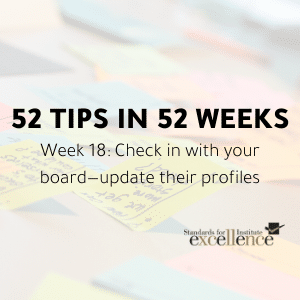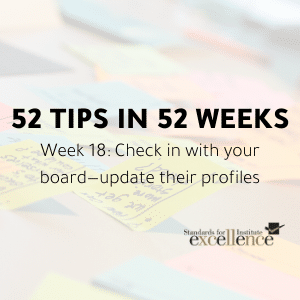

Since the Standards for Excellence program’s inception, nonprofits have received advice about how to run their board meetings, recruit new members, and avoid conflicts of interest, just to name a few of the ways we seek to strengthen boards. The Leadership section of the Standards for Excellence: An Ethics and Accountability Code for the Nonprofit Sector is a comprehensive section and includes benchmarks and best practices of the full range of board and staff leadership measures, as well as diversity, equity and inclusion – values applicable to all nonprofits.
By now, in the midst of the pandemic, you have probably already checked in with your board members to see how they are doing and may have had a virtual board meeting or two. Perhaps you’ve had a few members that have missed a virtual meeting. If you haven’t done so already, it would be a good time to confirm that your board members have access to the technology needed to be active and govern remotely. Also, be prepared to make adjustments to ensure maximum participation. Inquiring about such issues will help everyone stay on the same page and ready to serve.
While you are checking in, it may also be helpful to gather information to assess the current composition of your board.
The Standards for Excellence states:
· “The board should be composed of individuals who are personally committed to the mission of the organization and understand their roles as fiduciaries in performing the legal duties of a governing body;”
· “The board should establish a rigorous board development strategy for recruiting and selecting new members and ensuring that the board has an appropriate mix of talent, connections to the community, and diversity.”
Obtain updated biographical sketches for your board members. This information can help you to understand the background and key talents that your board members bring to the board room. This will help to refresh or expand your knowledge of their talents and interests—some of which may be particularly helpful in this time of pandemic.
Are you bringing on new board members in the coming months? Seize the opportunity to make connections with current members and new members—with folks serving as board member mentors for others. Having bios in hand may help you with matching up such individuals and making rich and meaningful introductions. Profiles can also be shared with new board members through a board handbook or portal to facilitate introductions and team building.
For more information on the composition of nonprofit boards, we encourage you to check out the Standards for Excellence educational resource packet Board Composition and Independence. This packet includes discussions and resources on board members’ commitment to the organization, employees serving on the board, board recruitment and selection, nominating processes and board development, board diversity, term limits, board size, and the voluntary nature of board members’ service.
This educational resource packet and the full series of all packets – including sample policies, tools and model procedures to help nonprofits achieve best practices in their governance and management – can be accessed by contacting a licensed Standards for Excellence replication partner, one of the over 150 Standards for Excellence Licensed Consultants, or by becoming a member of the Standards for Excellence Institute.
We share our sincere wishes for your continued good health and patience as we all navigate these challenging and uncertain times.



